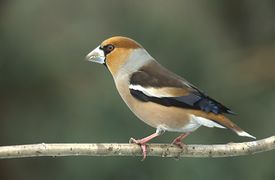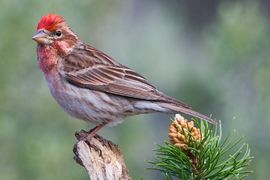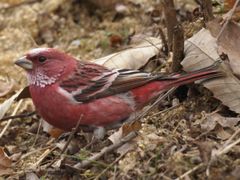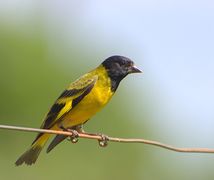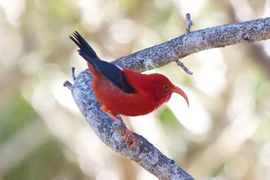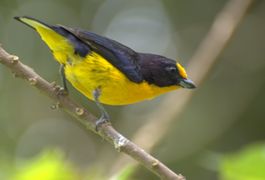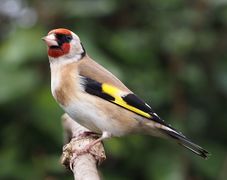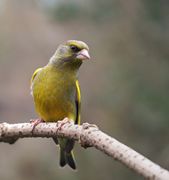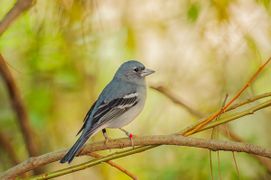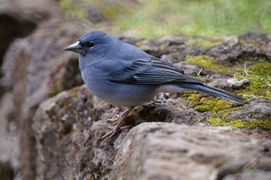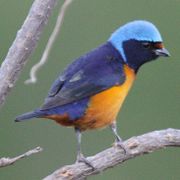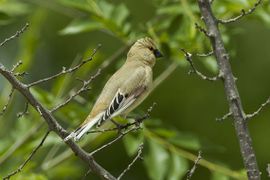حسون
| حسون | |
|---|---|
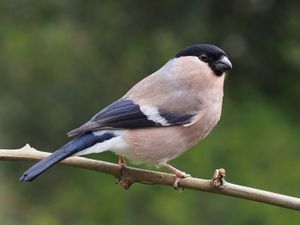
| |
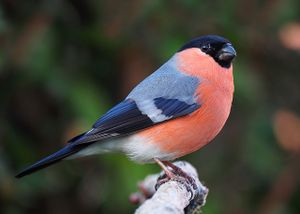
| |
| Eurasian bullfinch (female above, male below) | |
| التصنيف العلمي | |
| أصنوفة غير معروفة (أصلحها): | Fringillidae |
| Subfamilies | |
The true finches are small to medium-sized passerine birds in the family Fringillidae. Finches have stout conical bills adapted for eating seeds and often have colourful plumage. They occupy a great range of habitats where they are usually resident and do not migrate. They have a worldwide distribution except for Australia and the polar regions. The family includes species known as siskins, canaries, redpolls, serins, grosbeaks and euphonias.
Many birds in other families are also commonly called "finches". These groups include: the estrildid finches (Estrildidae) of the Old World tropics and Australia; some members of the Old World bunting family (Emberizidae) and the American sparrow family (Passerellidae); and the Darwin's finches of the Galapagos islands, now considered members of the tanager family (Thraupidae).[1]
Finches and canaries were used in the UK, Canada and USA in the coal mining industry, to detect carbon monoxide from the eighteenth to twentieth century. This practice ceased in the UK in 1986.[2]
| Finch phylogeny | |||||||||||||||||||||||||||||||||||||||||||||||||||||||||||||||||||||||||||||||||||||||||||||||||||||||||||||||||||||||||||||||||||||||||||||||||||||||||||||||
| |||||||||||||||||||||||||||||||||||||||||||||||||||||||||||||||||||||||||||||||||||||||||||||||||||||||||||||||||||||||||||||||||||||||||||||||||||||||||||||||
| Cladogram based on the analysis by Zuccon and colleagues published in 2012.[3] The rosefinches genus Carpodacus is expanded to include the common rosefinch as suggested by Tietze and colleagues[4] and adopted by the International Ornithological Committee.[5] |
List of genera
The family Fringillidae contains 228 species divided into 50 genera and three subfamilies. The subfamily Carduelinae includes 18 extinct Hawaiian honeycreepers and the extinct Bonin grosbeak.[5]
Subfamily Fringillinae
Subfamily Carduelinae
- Mycerobas – contains the four Palearctic grosbeaks
- Coccothraustes – contains three species
- Eophona – contains the two oriental grosbeaks, the Chinese and the Japanese grosbeak
- Pinicola – contains a single species, the pine grosbeak
- Pyrrhula – contains the seven bullfinch species
- Rhodopechys – contains two species, the Asian crimson-winged finch and the African crimson-winged finch
- Bucanetes – contains the trumpeter and the Mongolian finch
- Agraphospiza – contains a single species, Blanford's rosefinch
- Callacanthis – contains a single species, the spectacled finch
- Pyrrhoplectes – contains a single species, the golden-naped finch
- Procarduelis – contains a single species, the dark-breasted rosefinch
- Leucosticte – contains six species of mountain and rosy finches
- Carpodacus – contains the 27 Palearctic rosefinch species
- Hawaiian honeycreeper group (tribe Drepanidini)
- Melamprosops – contains a single critically endangered species, the poo-uli
- Paroreomyza – contains three species, the Oahu alauahio, the Maui alauahio and the extinct kakawahie
- Oreomystis – contains a single species, the akikiki
- Telespiza – contains four species, the Laysan finch, the Nihoa finch, and 2 prehistoric species
- Loxioides – contains 2 species, the palila and a prehistoric species
- Rhodacanthis – contains two recently extinct species, the lesser and the greater koa finch, and 2 prehistoric species
- Chloridops – contains a single extinct species, the Kona grosbeak
- Psittirostra – contains a single species, the ou
- Dysmorodrepanis – contains a single extinct species, the Lanai hookbill
- Drepanis – contains two extinct species, the Hawaii mamo and the black mamo, and the extant iiwi
- Ciridops – contains a single recently extinct species, the Ula-ai-hawane, and 3 prehistoric species
- Palmeria – contains a single species, the akohekohe
- Himatione – contains two species, the apapane and the extinct Laysan honeycreeper
- Viridonia – contains a single extinct species, the greater amakihi
- Akialoa – contains four recently extinct species, and 2 prehistoric species
- Hemignathus – contains four species, only one of which is extant
- Pseudonestor – contains a single species, the Maui parrotbill
- Magumma – contains a single species, the anianiau
- Loxops – contains five species, of which one is extinct
- Chlorodrepanis – contains three species, the Hawaii, Oahu and Kauai amakihi
- Haemorhous – contains the three North America rosefinches
- Chloris – contains the five greenfinches
- Rhodospiza – contains a single species, the desert finch
- Rhynchostruthus – contains the three golden-winged grosbeaks
- Linurgus – contains a single species, the oriole finch
- Crithagra – contains 37 species of canaries, serins and siskins from Africa and the Arabian Peninsula
- Linaria – contains four species including the twite and three linnets
- Acanthis – contains three redpolls
- Loxia – contains six crossbills
- Chrysocorythus – contains a single species, the mountain serin
- Carduelis – contains three species including the European goldfinch
- Serinus – contains eight species including the European serin
- Spinus – contains 20 species including the North American goldfinches and the Eurasian siskin
Subfamily Euphoniinae
- Euphonia – contains 27 species all with euphonia in their English name
- Chlorophonia – contains 5 species all with chlorophonia in their English name
Gallery
Cassin's finch (Haemorhous cassinii), an American rosefinch
Pallas' rosefinch (Carpodacus roseus), a true rosefinch
Hooded siskin (Spinus magellanica)
ʻIʻiwi (Vestiaria coccinea), a Hawaiian honeycreeper
Male violaceous euphonia (Euphonia violacea)
European goldfinch (Carduelis carduelis)
European greenfinch (Chloris chloris)
Gran Canaria blue chaffinch (Fringilla polatzeki)
Tenerife blue chaffinch (Fringilla teydea)
Elegant euphonia (Euphonia elegantissima)
Desert finch (Rhodospiza obsoleta)
See also
== المراجع ==
- ^ Newton (1973), Clement et al. (1993)
- ^ Eschener, Kat (30 December 2016). "The Story of the Real Canary in the Coal Mine". Smithsonian. Retrieved 11 June 2018.
- ^ خطأ استشهاد: وسم
<ref>غير صحيح؛ لا نص تم توفيره للمراجع المسماةZuccon2012 - ^ Tietze, D.T.; Päckert, M.; Martens, J.; Lehmann, H.; Sun, Y.-H. (September 2013). "Complete phylogeny and historical biogeography of true rosefinches (Aves: Carpodacus)". Zoological Journal of the Linnean Society. 169: 215–234. doi:10.1111/zoj.12057.
- ^ أ ب خطأ استشهاد: وسم
<ref>غير صحيح؛ لا نص تم توفيره للمراجع المسماةioc
Sources
- Clement, Peter; Harris, Alan & Davis, John (1993): Finches and Sparrows: an identification guide. Christopher Helm, London. ISBN 0-7136-8017-2
- Hír, János; Kókay, József; Venczel, Márton; Gál, Erika; Kessler, Eugén (2001). "Elõzetes beszámoló a felsõtárkányi "Güdör-kert" n. õslénytani lelõhelykomplex újravizsgálatáról [A preliminary report on the revised investigation of the paleontological locality-complex "Güdör-kert" at Felsõtárkány, Northern Hungary]". Folia Historico Naturalia Musei Matraensis (in Hungarian). 25: 41–64.
{{cite journal}}: CS1 maint: unrecognized language (link) - Jønsson, Knud A.; Fjeldså, Jon (2006). "A phylogenetic supertree of oscine passerine birds (Aves: Passeri)". Zool. Scripta. 35 (2): 149–186. doi:10.1111/j.1463-6409.2006.00221.x.
- Marten, Jill A.; Johnson, Ned K. (1986). "Genetic relationships of North American cardueline finches" (PDF). Condor. 88 (4): 409–420. doi:10.2307/1368266.
- Newton, Ian (1973): Finches (New Naturalist series). Taplinger Publishing. ISBN 0-8008-2720-1
وصلات خارجية
- Internet Bird Collection.com: Finch videos, photos, and sounds
- National Finch and Softbill Society website — organization promoting finch breeding.
- . . 1914.
خطأ لوا في وحدة:Authority_control على السطر 278: attempt to call field '_showMessage' (a nil value).
- Articles with hatnote templates targeting a nonexistent page
- Automatic taxobox cleanup
- Wikipedia articles incorporating citation to the NSRW
- Wikipedia articles incorporating citation to the NSRW with an wstitle parameter
- Finches
- طيور حسب الاسم الشائع
- Fringillidae
- عصفورينات
- Miocene birds
- Quaternary birds
- Extant Miocene first appearances
